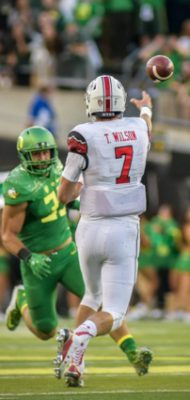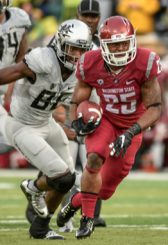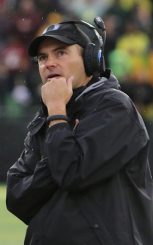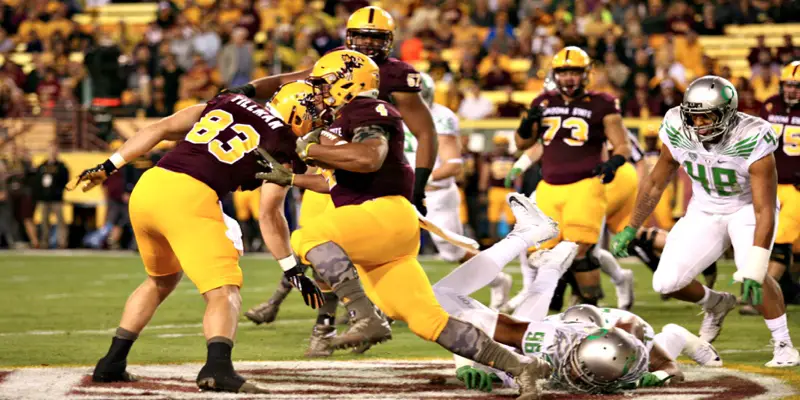The Grizzled Ol’ Coach, Mike Morris, has been instrumental in so many of us learning the Oregon Offense and Defense in the past four years. His “Skull” sessions with me in the FishDuck.com ManCave are legendary encounters in learning, and he does have some strong views about this team.
Sometimes Mike raises more questions for us with his musings, and in the tradition of offering an article that makes us ponder — I welcome his thoughts.
— Charles Fischer
Mr. FishDuck asked me to express my opinions on why the Oregon defense has performed so badly this season. It’s easy (and liberating, for some folks) to harshly criticize outcomes people don’t like, but it is, usually, incredibly difficult to come up with credible solutions to those misbehaviors.
If I could give answers to solving the Ducks’ football problems, the coaches, who know much more than I, would have corrected things by now. However, I do have some observations to offer that I think are relevant.
Before I give those (hopefully reasonable) opinions, let’s establish some facts:
“It’s not what you do; it’s the way you do it.”

Travis Wilson of Utah
Those of you who want to change the scheme, and/or how many rush the passer, or offensively question the pass or run calls, are misguided. Almost any scheme, or play call, can be (and has often been) successful if it’s executed correctly.
There is no secret, magical defensive system that can transform a mediocre defensive team into a very good one.
And there is no defensive coordinator, at any level, who can make that transformation with strategy. I, and many other coaches, think Gary Patterson, of TCU, is the best defensive coach out there, but check this year’s TCU scores.
Alabama gave up 43 points to Mississippi? In today’s college football, there is no such thing as a defensive genius.
“It’s the Jimmy’s and the Joe’s, not the X’s and the O’s.”
Often, the other guy is just better. The job of a coach is to either exploit or cover-up for those talent gaps. My definition of great coaching is getting a player to play to the maximum of his potential. But sometimes/often that’s not enough to win the individual match-up or game.
Having established those beliefs, can I criticize the Ducks’ defense?
Sure. And I’m sure the Duck coaches would agree with these criticisms. They’re two types of mistakes: physical and mental. Physical mistakes can kind of be forgiven; mental errors should be unacceptable.
Lack of Communication
How many times do we have to hear a lament about the “lack of communication” on a play? Defensively, a missed tackle or completed pass is bad; nobody being there to even attempt the tackle or break up the pass is terrible. Those “no-one- there plays” result from mental errors.
In high school, we called it “coaching to the lowest common denominator” (our most easily confused defender). If just one defensive player didn’t know what to do, the results could be disastrous.
The trouble is today’s college football offenses — with no huddles and all kinds of formations, shifts and motion — are largely based on confusing the defense. Over the years, in analyzing the Ducks’ offense, an amazing amount of their big plays and TDs occurred because of opponents’ mental goofs.

Trailing from behind …
Mental Errors
The Ducks have made far too many mental mess-ups, but how does the Oregon defense avoid this?
They must make sure that every defender knows exactly what he must do in every situation. It’s better to be in a worse scheme when everyone knows exactly what to do than be in a possibly really cool scheme with possibly confused players.
Predictably is better than mental errors. Sometimes coaches can be too smart/creative. Of course the Duck coaches know this, but how much defense is too much?
Physical mistakes happen because players haven’t learned how to do things well yet, or they just don’t have enough ability to do the job.
In college football, both of those painful realities are almost always caused by poor recruiting choices.
Delusions of Grandeur
When the next man up can’t do the job, he either was forced into playing before he was really ready, or he’d never be consistently capable.
If a corner isn’t fast enough, or a defensive or offensive lineman strong enough, all the best technique coaching can’t help him from being beaten. If an inside LB still isn’t a good tackler after several games, he’ll undoubtedly never be.
And just because a young man has outstanding character doesn’t mean he’s capable of being an outstanding football player.

Mark Helfrich
The thing that worries me most about Oregon’s coaches — defensively and offensively — is their possibly having delusions of grandeur. Confidence is a very good thing; too much unwarranted confidence can be disastrous.
Thinking Jeff Lockie can be a really good QB because he had so many practices, or favorably comparing young Tyree Robinson to All-Pro Richard Sherman, or thinking Rodney Hardrick would finally get it his senior year because Kiko Alonso did, are examples.
I could go on. But realistic evaluations of what your players are capable of actually doing is so essential to successful coaching.
Obviously Mark Helfrich, Don Pellum, and the other guys are great football coaches. They don’t need me to defend them or offer them advice.
But I was asked for my opinions. Giving logical opinions, based on 30 years of coaching and 50 years of studying football, probably isn’t as much fun for many of you to read as suggestions for new coaches or schemes, but it’s the best I can do.
Related Articles:
Seven Offensive Coordinator Candidates for the Oregon Ducks
Five Candidates to Replace OC Marcus Arroyo
Coach Jim Mastro: The Perception, and the Truth
Has Oregon Turned the Corner on Offense?
Ducks, Taggart Punish Beavers; Earn Bowling Trip
Textbook Defense, Herbert's Return Energize Duck Victory; Civil War Next
Coach Mike Morris spent 30 years coaching at seven different high schools throughout Southern California. He coached many players who went on to Pac-12 programs including Oregon, such as Saladin McCullough. He is a writer, Football analyst and a good friend of the Principal of the site.

